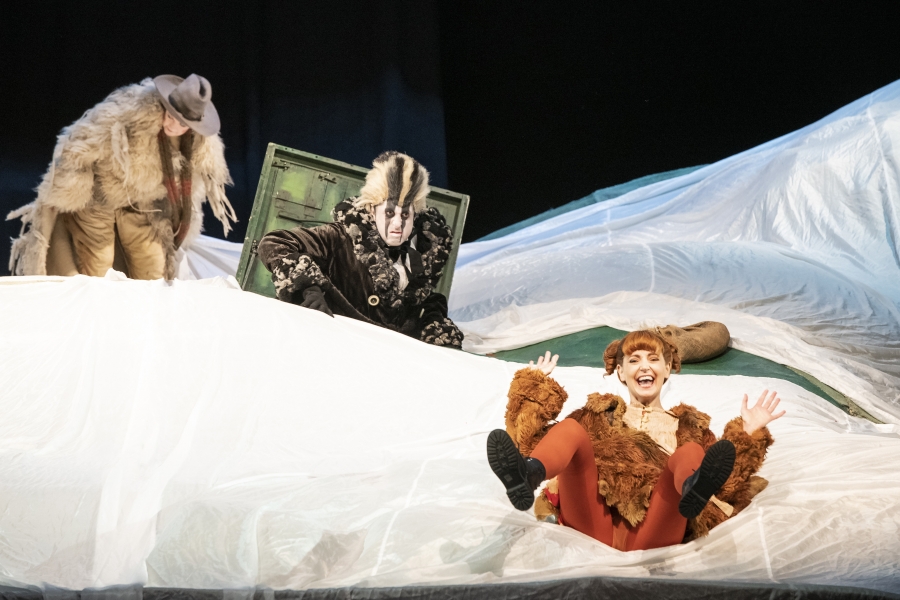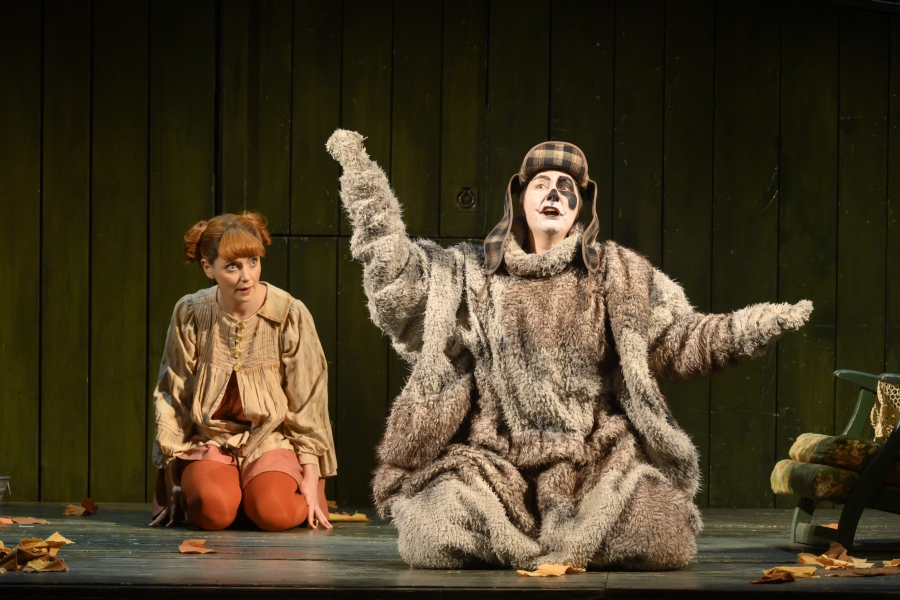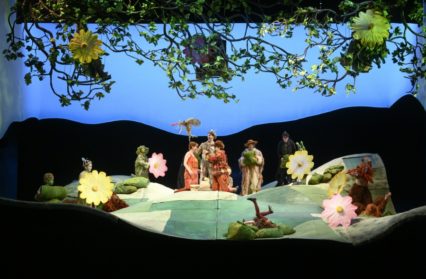Janáček’s The Cunning Little Vixen – Nigel Jarrett welcomes the revival of a landmark production by Welsh National Opera of an enchanting Czech masterpiece.
David Pountney’s eight-year illumination of Welsh National Opera makes a brilliant late surge with this revival of his 1980 production of Janáček’s The Cunning Little Vixen. It’s a farewell wave by the company as it moves on with Pountney’s replacement Aidan Lang as general director. But it also recalls the days when Charles Mackerras, at one time WNO’s music chief, made Janáček’s operas – The Makropoulos Case, Jenufa, Katya Kabanova, From The House Of The Dead, and Vixen – a speciality, no less by his followers in Cardiff than elsewhere. Mackerras himself, a protégé of the Czech conductor Vaclav Talich, was as close to the composer’s output as the current MD, Tomáš Hanus. Lang and Hanus plan more Janáček in the next four years.
The current revival of The Cunning Little Vixen benefits from a few tweaks yet its essential brightness remains undimmed. The tweaking is mainly terpsichorean and vocal. Elaine Tyler-Hall enhances the original choreography of Stuart Hopps, and the libretto is sung in Czech, the latter no small achievement according to even seasoned opera performers. Forty years ago, the children who played such important roles in the opera as the forest’s anthropomorphed fauna and flora were something relatively new for the company. Today, they have taken over in an almost wish-fulfilled assertion that they are the new generation, re-birth and the natural cycle, and a few other things, being what Vixen‘s about. The production has been the subject of educational work with local schools; children in opera casts these days – the WNO’s new production of Bizet’s Carmen another case in point – are more smartly directed and musically fine-tuned; and school kids now learn the facts of life from blasé teachers as well as from, er, other media. Vixen’s post-coital enervation as she emerges from her den with Fox (the usurped Badger’s sett) will soon be explained to or by the young, if not immediately obvious: one never knows these days.

Photo credit: Richard Hubert Smith
But it’s just as well. Early on in this production there’s a full-frontal attempt at congress between the Dog (Helen Greenaway) and the Vixen – and if you didn’t know why a cockerel is surrounded by a clucking of hens, you soon would. This Cockerel (Michael Clifton-Thompson) and his brood (Chief Hen, Meriel Andrew) are a gallinaceous hoot. Berated by the temporarily captured Vixen for their subservience, the hens prefer safety in domesticity and numbers. That’s the problem with anthropomorphism: it lays bare the life of the wild but it also has animal life mimicking human life and, beyond humanity, living in clubbable rather than Darwinian harmony. Maybe it’s not a problem at all and that it’s the similarities which are being depicted. At least Vixen’s attempts at fleeing capture are finally successful, but the tooth-and-claw reality of wildlife as she despatches a young hare is Beatrix Potter bloodless. As well as the sex, there’s a flash of full-on politics, the Badger (Laurence Cole) carrying the can for fur-clad, subterranean privilege in Jiri Zahrádka’s revised libretto.
The humans in The Cunning Little Vixen do not match the life-force and spirit of their woodland neighbours; they’re a pathetic lot and attract our sympathy by default. The point about such a story is that in real life humans reflect but non-human animals don’t, as far as it goes. The Forester (Claudio Otelli), the Parson ((Wojtek Gierlach), the Poacher (David Stout), and the Schoolmaster (Peter Van Hulle) sing their reflections with a firm grasp of the Janáček style, its displaced rhythms and motifs and its sharp and disparate, painterly structures echoing the natural world. (The sound of the WNO orchestra tuning up is like a teeming forest before a gunshot.) Likewise, musically, the animals: Ulster soprano Aoife Miskelly is dazzling as Vixen, both in sound and motion, her pre-coitals with Lucia Cervoni’s ‘trousered’ Fox a joy. Vixen, of course, is an image in human minds of beauty and canny independence, when she’s not seeing off hens for the sheer love of killing. Here, she is symbolised by dancer Lucy Burns’s Spirit of Vixen. Her human form is Terynka, not seen on stage, who is doted on by the Schoolmaster but eventually marries the Poacher. The Forester’s final philosophical scena is as powerful as it gets, thanks to Otelli’s magisterial presence and Hanus’s sense of musical and dramatic denouement. Many others populate the stage, including Martin Lloyd’s Innkeper and Sarah Pope as his wife, all contributing to its picture-perfection.

Photo credit: Richard Hubert Smith
The triumph of Janáček as librettist and Rudolf Těsnohlídek, the writer whose stories inspired him (and no less the popular cartoons based on them by Stanislav Lolek), was in the establishing of charm and the avoidance of the Potteresque twee; the achievement of Pountney, apart from his own sense of theatre, was to have chosen Maria Bjørnson as his designer. The set and costumes, and Nick Chelton’s lighting (here realised by Ian Jones), retain their enchantment. But what gives this revival additional heft is the conducting of Hanus, the playing of the orchestra and the off-stage singing of the chorus. Chorus master Andrew Greenwood is doing conspicuously good work in maintaining WNO’s world-class standards.
This is Janáček staging without reservation; it’s also the turn of a wheel in that Pountney arrived at WNO in 2011 with another look at Katie Mitchell’s version of Katya Kabanova, first staged at the New Theatre, Cardiff, in 2001, and presented then as a tribute to Mackerras. There’s a momentum here; Lang, Hanus and the WNO Janáček Circle of supporters will see to its maintenance.
You might also like…
David Truslove attended a London showing of Philip Venables’ disturbing new opera from Music Theatre Wales; Denis & Katya.
Nigel Jarrett is a former newspaperman. He is a winner of the Rhys Davies prize and the Templar Shorts award for short stories, and is represented in the Library of Wales’s anthology of 20th– and 21st-century short fiction. Among others, he writes for Acumen poetry magazine, Jazz Journal, and on music and other subjects for the Wales Arts Review. His pamphlet of stories, A Gloucester Trilogy, has just been published by Templar Press. His review of Bizet’s Carmen, another WNO offering in the current season, also appears here.
The Cunning Little Vixen



 Enjoyed this article? Support our writers directly by buying them a coffee and clicking this link.
Enjoyed this article? Support our writers directly by buying them a coffee and clicking this link.







